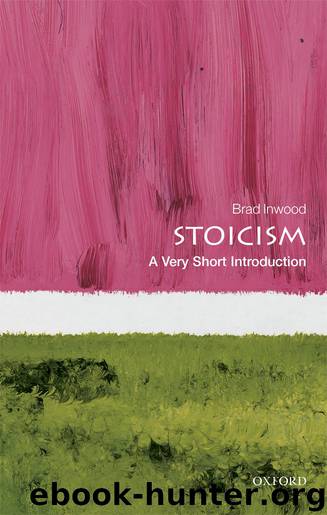Stoicism by Brad Inwood

Author:Brad Inwood
Language: eng
Format: epub
ISBN: 9780191090318
Publisher: Oxford University Press
Published: 2018-05-14T00:00:00+00:00
4. ‘ … it is by their own natures that the cylinder rolls and the cone spins’. (Cicero, On Fate 42)
But one might well wonder whether that preserves human freedom; agency might be safe, but it might seem to be a rather unfree sort of agency, barely worthy of the name. In reply, a Stoic will press his critic on what they mean by freedom. Are they looking for some sort of radical indeterminacy, so that we are in a position to decide to do absolutely anything on any occasion, regardless of our personality, character, state of knowledge, or prior inclinations and commitments? Is that really what we value, the chance to act randomly and without motivation or connection to our own past and present character (as though some random mental event, such as the ‘swerve’ posited by the Epicureans, led to our choice)? If so, then Stoics, who think that it is markedly better to do things for reasons and not at random, will cheerfully reject that sort of freedom. But what would happen, we might still ask them, if we faced a choice about how to act and were paralysed by knowing that the outcome was already fixed? Here the Stoics reply with a distinction. We do know that at some level the outcome is fixed—they are determinists, after all. But we humans (unlike Zeus) don’t and can’t know what the outcome is in any particular case. We don’t have complete and in-depth knowledge of our own characters and inclinations; we have only a partial grasp of the circumstances relevant to the choice we face. So as rational agents we still have to think through as best we can what the right thing to do is. That some ideal and perfectly informed observer (such as a mind-reading Zeus?) might be able to predict what I am going to decide doesn’t change the fact that the decision is one that I make—and just as important, that it is a decision for which I can reasonably be held accountable. My actions are expressions of who I am and how I reason, so I get credit for good choices and blame for bad ones.
But hold on. Critics of compatibilism come back with one more objection. Our characters are not wholly of our own making, are they? We owe what we are to our physical inheritance, our early education, our social situation, the choices we made before we had enough rationality to be taken seriously as moral agents, and many other factors beyond our control. So if this character of mine makes a good or bad decision, the credit or blame surely doesn’t go to me but to that network of influences and causes that make my character what it is. The network of fated events doesn’t just present me with the external circumstances in which I have to act, but it also presents me with my character. How can it be fair to assign either praise or blame to me rather
Download
This site does not store any files on its server. We only index and link to content provided by other sites. Please contact the content providers to delete copyright contents if any and email us, we'll remove relevant links or contents immediately.
The remains of the day by Kazuo Ishiguro(8961)
Tools of Titans by Timothy Ferriss(8357)
Giovanni's Room by James Baldwin(7313)
The Black Swan by Nassim Nicholas Taleb(7097)
Inner Engineering: A Yogi's Guide to Joy by Sadhguru(6780)
The Way of Zen by Alan W. Watts(6589)
Asking the Right Questions: A Guide to Critical Thinking by M. Neil Browne & Stuart M. Keeley(5747)
The Power of Now: A Guide to Spiritual Enlightenment by Eckhart Tolle(5740)
The Six Wives Of Henry VIII (WOMEN IN HISTORY) by Fraser Antonia(5493)
Astrophysics for People in a Hurry by Neil DeGrasse Tyson(5172)
Housekeeping by Marilynne Robinson(4430)
12 Rules for Life by Jordan B. Peterson(4298)
Double Down (Diary of a Wimpy Kid Book 11) by Jeff Kinney(4257)
The Ethical Slut by Janet W. Hardy(4235)
Skin in the Game by Nassim Nicholas Taleb(4231)
Ikigai by Héctor García & Francesc Miralles(4228)
The Art of Happiness by The Dalai Lama(4118)
Skin in the Game: Hidden Asymmetries in Daily Life by Nassim Nicholas Taleb(3985)
Walking by Henry David Thoreau(3948)
